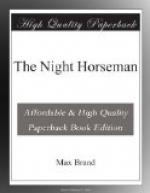A strange feeling for the doctor! He came from the region of the mind where that which is not spoken does not exist, and now this girl was carrying him swiftly away from hypotheses, doubts, and polysyllabic speech into the world—of what? The spirit? The doctor did not know. He only felt that he was about to step into the unknown, and it held for him the fascination of the suspended action of a statue. Let it not be thought that he calmly accepted the sheer necessity for silence. He fought against it, but no words came.
It was evening: the rolling hills about them were already dark; only the heads of the mountains took the day; and now they paused at the top of a rise and the girl pointed across the hollow. “There we are,” she said. It was a tall clump of trees through which broke the outlines of a two-storied house larger than any the doctor had seen in the mountain-desert; and outside the trees lay long sheds, a great barn, and a wide-spread wilderness of corrals. It struck the doctor with its apparently limitless capacity for housing man and beast. Coming in contrast with the rock-strewn desolation of the plains, this was a great establishment; the doctor had ridden out with a waif of the desert and she had turned into a princess at a stroke. Then, for the first time since they left Elkhead, he remembered with a start that he was to care for a sick man in that house.
“You were to tell me,” he said, “something about the sickness of your father—the background behind his condition. But we’ve both forgotten about it.”
“I have been thinking how I could describe it, every moment of the ride,” she answered. Then, as the gloom fell more thickly around them every moment, she swerved her horse over to the mare, as if it were necessary that she read the face of the doctor while she spoke.
“Six months ago,” she said, “my father was robust and active in spite of his age. He was cheerful, busy, and optimistic. But he fell into a decline. It has not been a sudden sapping of his strength. If it were that I should not worry so much; I’d attribute it to disease. But every day something of vitality goes from him. He is fading almost from hour to hour, as slowly as the hour hand of a clock. You can’t notice the change, but every twelve hours the hand makes a complete revolution. It’s as if his blood were evaporating and nothing we can do will supply him with fresh strength.”
“Is this attended by irritability?”
“He is perfectly calm and seems to have no care for what becomes of him.”




